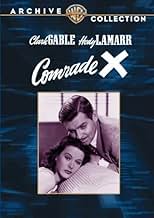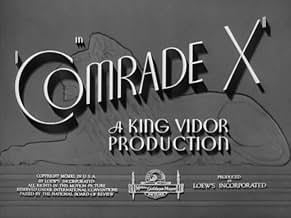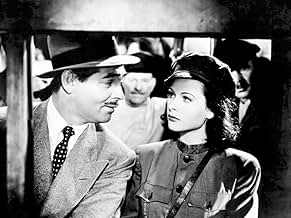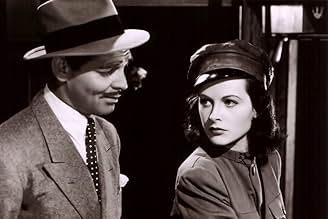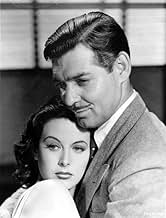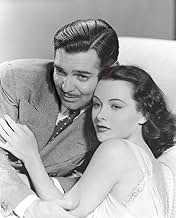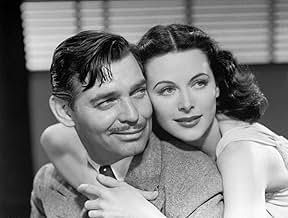An American reporter smuggling news out of Soviet Moscow is blackmailed into helping a beautiful Communist leave the country.An American reporter smuggling news out of Soviet Moscow is blackmailed into helping a beautiful Communist leave the country.An American reporter smuggling news out of Soviet Moscow is blackmailed into helping a beautiful Communist leave the country.
- Nominated for 1 Oscar
- 1 nomination total
Sig Ruman
- Emil Von Hofer
- (as Sig Rumann)
Georges Renavent
- Laszlo
- (as George Renevant)
Ed Agresti
- Press Correspondent
- (uncredited)
Alexander Asro
- Russian Waiter
- (uncredited)
William Bailey
- Press Correspondent
- (uncredited)
Al Bain
- Marriage Bureau Customer
- (uncredited)
Lici Balla
- Russian Woman
- (uncredited)
Leon Belasco
- Comrade Baronoff - Hotel Manager
- (uncredited)
John Bleifer
- Russian Marriage License Clerk
- (uncredited)
- …
6.61.9K
1
2
3
4
5
6
7
8
9
10
Featured reviews
hilarious
I thought the chemistry between Hedy and Clark were great. She really came off as a very good commedienne. I thought the lines were real clever and that ending...wow...all those tanks. I enjoyed this movie more than the Ninotchka.
Amusing comedy with overtones of "Ninotchka"...
CLARK GABLE and HEDY LAMARR share the screen in a romantic comedy along the lines of "Ninotchka", which made such a success for Greta Garbo. Obviously, Louis B. Mayer hoped COMRADE X would do for Hedy what the other film did for Garbo's image--and to some extent, it did.
It's not as sophisticated and witty as the Garbo film, but Hedy plays a dedicated Soviet woman who thinks that an American that she is attracted to (CLARK GABLE) shares the same philosophy. FELIX BRESSART is her scatterbrained father, EVE ARDEN is an American newspaper woman and SIG RUMAN is a loyal Nazi foreign correspondent in Russia who is just as confused as everyone else as to the identity of "Comrade X".
It's a good role for Hedy, playing her role very much the way Cyd Charisse played the Russian gal in "Silk Stockings", and with a comic flair that she seldom exhibited in any of her MGM films, even the so-called comedies. Gable is more or less himself as the cynical newspaper man who ends up taking his bride (Lamarr) to America after they've had a few escapades that have the Soviet authorities chasing them all over the hillsides in tanks--the film's most amusing moments.
One of the funniest performances comes from NATASHA LYTESS, as Olga, a secretary who tells Gable she's a spy. Her drunken antics are a highlight (she can't see a thing without her glasses). Lytess was Marilyn Monroe's acting coach for several years, the superstar being dependent on her for her every move during her early films at Fox.
It's not as sophisticated and witty as the Garbo film, but Hedy plays a dedicated Soviet woman who thinks that an American that she is attracted to (CLARK GABLE) shares the same philosophy. FELIX BRESSART is her scatterbrained father, EVE ARDEN is an American newspaper woman and SIG RUMAN is a loyal Nazi foreign correspondent in Russia who is just as confused as everyone else as to the identity of "Comrade X".
It's a good role for Hedy, playing her role very much the way Cyd Charisse played the Russian gal in "Silk Stockings", and with a comic flair that she seldom exhibited in any of her MGM films, even the so-called comedies. Gable is more or less himself as the cynical newspaper man who ends up taking his bride (Lamarr) to America after they've had a few escapades that have the Soviet authorities chasing them all over the hillsides in tanks--the film's most amusing moments.
One of the funniest performances comes from NATASHA LYTESS, as Olga, a secretary who tells Gable she's a spy. Her drunken antics are a highlight (she can't see a thing without her glasses). Lytess was Marilyn Monroe's acting coach for several years, the superstar being dependent on her for her every move during her early films at Fox.
Purging as we go
With the success MGM had with Ninotchka another lampooning of the Soviet Union seemed a natural. So the following year while the Hitler-Stalin pact was still active, MGM came up with Comrade X.
Comrade X is a pseudonym for some journalist who is sending uncensored stories out about the real Soviet Union. It happens to be Clark Gable and the whole Soviet secret police apparatus is after him.
But a valet at a hotel where the foreign correspondents stay played by Felix Bressart comes upon his secret. He offers a deal to Gable, he won't turn him in if Gable convinces Bressart's daughter Hedy Lamarr to leave the Soviet Union with him and come to America.
Easier said than done because Lamarr is as committed a Communist as Greta Garbo was in Ninotchka. So like Melvyn Douglas in Ninotchka, Gable's got his work cut out for him.
Comrade X's humor is a little more broad than Ninotchka's was. It even got a few good knocks in on Nazi Germany with Sig Ruman playing a German correspondent. The humor about the Soviets concerns what a dangerous thing it was to rise in the ranks of the party. Remember this was also the time of Stalin purging all kinds of people out of the party. Something that didn't stop until Hitler broke the non-aggression pact in 1941.
And Hedy Lamarr is sure no Garbo, but she acquits herself nicely in the role of the fuzzy headed idealist.
Gable, Lamarr, and Bressart get caught up in the internal politics of the Soviet Union and have to flee the country. What happens to them is the balance of the film and it is hilarious.
One of the best films done by both of the stars. Grand comedy.
Comrade X is a pseudonym for some journalist who is sending uncensored stories out about the real Soviet Union. It happens to be Clark Gable and the whole Soviet secret police apparatus is after him.
But a valet at a hotel where the foreign correspondents stay played by Felix Bressart comes upon his secret. He offers a deal to Gable, he won't turn him in if Gable convinces Bressart's daughter Hedy Lamarr to leave the Soviet Union with him and come to America.
Easier said than done because Lamarr is as committed a Communist as Greta Garbo was in Ninotchka. So like Melvyn Douglas in Ninotchka, Gable's got his work cut out for him.
Comrade X's humor is a little more broad than Ninotchka's was. It even got a few good knocks in on Nazi Germany with Sig Ruman playing a German correspondent. The humor about the Soviets concerns what a dangerous thing it was to rise in the ranks of the party. Remember this was also the time of Stalin purging all kinds of people out of the party. Something that didn't stop until Hitler broke the non-aggression pact in 1941.
And Hedy Lamarr is sure no Garbo, but she acquits herself nicely in the role of the fuzzy headed idealist.
Gable, Lamarr, and Bressart get caught up in the internal politics of the Soviet Union and have to flee the country. What happens to them is the balance of the film and it is hilarious.
One of the best films done by both of the stars. Grand comedy.
American reporter falls for Communist in 1940 Russia
The film fascinates because it was made in 1940, just when WWII was getting started. Nazi Germany and Soviet Russia had just divided Poland between them and neither Nazis nor Communists much admired by most Americans. Our hero, played by Clark Gable, is forced by the Soviets to share his hotel room with a Nazi journalist. The Nazi is a caricature, as are the Soviets, who are shown ordering assassinations a¿of anyone they dislike. At one point the Gable character creates a diversion by shouting out that Germany has just invaded Russia. He is, of course, shouting a year too soon, but the reaction is interesting. The plot itself is foolish, but the glimpse into the past, with references to the Brooklyn Dodgers murdering the Reds (of Cincinatti) makes the movie great fun.
Wait for the tanks
In the days when actresses had genuine accents that put a lilt in their speech, Hedy Lamarr, like Greta Garbo and Ingrid Bergman, had refinement and intelligence, and could portray "foreigners" from any number of countries. Here, Hedy is supposed to be Russian, and with a light touch, too. She makes a charming foil to beefy Clark Gable, who plays his usual role as the macho-male with a wink in his eye covering a heart of gold. Their chemistry is not quite as magical as that in "It Happened One Night," with Claudette Colbert (who had the softer edge and mysterious sex appeal that truly complemented Gable's), or even his pairings with the brassy blonde with the Brooklyn accent, but there are a number of scenes in this farce that I have not seen equalled elsewhere: namely the escape scene in the Soviet tank. Before the age of graphic simulation, the prop men really had to come up with a phalanx of Soviet-style tanks -- unless they used miniatures, and to see them "chase" Gable, with Hedy at the wheel, is almost on a par with a Chaplin or Keaton routine. The miming of the Soviet tank army is also hilarious.
Did you know
- TriviaAt the time this film was released in 1940, World War II had already begun in Europe, but the Soviet Union still had a non-aggression pact with Nazi Germany. In the film, Mac is able to fool a character by pretending to hear news that Germany has broken the pact and launched an invasion of the USSR. That's exactly what happened the very next year when Germany launched Operation Barbarossa in summer 1941.
- GoofsThe script makes reference to the Soviet law that a person could divorce his or her spouse simply by sending them a postcard announcing that the marriage was over. But in 1936, four years before this film was made, Stalin had repealed that law when he rewrote the Russian constitution and made divorces considerably harder to get.
- Crazy credits"RUSSIA. The never never land of steppes, samovars and spies -- beards, bears, bombs and borscht - where almost anything can happen - and usually does. "
- ConnectionsFeatured in The Miracle of Sound (1940)
- SoundtracksFuniculi, Funicula
(1880) (uncredited)
Lyrics by Peppino Turco
Music by Luigi Denza
Sung a cappella with modified lyrics by Clark Gable
- How long is Comrade X?Powered by Alexa
Details
- Runtime
- 1h 44m(104 min)
- Color
- Aspect ratio
- 1.37 : 1
Contribute to this page
Suggest an edit or add missing content


